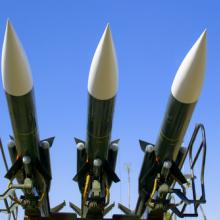sarin gas
A suspected Syrian government chemical attack killed scores of people, including children, in the northwestern province of Idlib on Tuesday, a monitoring group, medics, and rescue workers in the rebel-held area said. The U.S. government believes the chemical agent sarin was used in the attack, a U.S. government source said, adding it was "almost certainly" carried out by forces loyal to Syrian President Bashar al-Assad.
There’s a catch phrase that comes to the fore when people start looking for religious reasons not to enter a war like the one now raging in Syria: “Who would Jesus bomb?”
Jesus would not have bombed anyone, of course. Bombs were not weapons of choice in his day. But the cruelty of war was no stranger to his era. The Romans could be every bit as cruel as Syria’s Bashar al-Assad. They executed dissidents like Jesus himself with ease. They leveled the city of Jerusalem.
But if it is hard to imagine Jesus targeting a cruise missile aimed at another nation, it is not hard to imaging him encouraging his followers to stand with those who are most vulnerable, to seek ways to defend others from cruelty, to come to the aid of those refugees displaced by war. The question is how best to do that.

